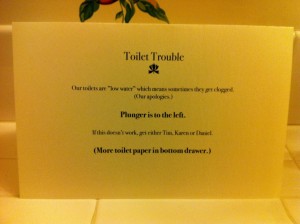
Misunderstanding, misinterpretation, miscommunication - these are scourges of modern communication. And real pisser is that, of all of the potential speed bumps we’re likely to encounter over the course of a project, job or even a professional relationship — the issue I’d like to discuss is arguably the easiest to alleviate if we’d all try a little harder to be sure we include the oft-forgotten ingredient.
Clarity.
I’ve managed to capture a couple of examples of the kind of thing I mean. You know, for clarity’s sake.
I saw this sign a few mornings ago in a parking structure and it gave me pause. At first, I thought the “at all times” part was redundant since, when taken literally, “One hour parking” is pretty damn straightforward. The more I thought about it, though, the more I realized how beneficial it was to have the whole of the rule spelled out so frankly so as to leave zero room for mistake. The language used here is undoubtedly for the benefit of the people parking their cars in the related area because, once they read the sign, there can’t be any doubt as to how long they can leave their Saturn parked there while they’re in the Kinko’s. The rule is right there, plain as day — and anybody found to be in violation of said rule is going to have a hell of a time convincing anybody that the rule was anything but utterly clear.
I snapped this earlier in the bathroom at a friend’s house (you can click it for a bigger version if it’s difficult to read). This isn’t so different from the parking lot sign because they’re both meant to preemptively inform. If you try to force an inordinate amount of matter down the commode in question, you’re going to have a plunger situation on your hands. I won’t argue that this isn’t the case at many households, but this is the first time I’ve encountered a household who a) thought to establish a “crapper escalation procedure” and b) document it publicly so that visitors know what to expect and how to proceed if the situation should take a turn south.
Think about the last five email messages you sent, or the last five meetings you’ve had. Chances are, there were several instances when you or another involved party could have done a better job of clarifying responsibility, outcome or implementation details.
Deliberately inserting ambiguity into situations is a pretty damn effective means of procrastinating or deferring responsibility. How many times have you been invited to a meeting to “clarify project requirements” or “crystalize strategy”? I’ve been to a freaking shitload of these meetings and it never ceases to amaze me how utterly unnecessary they turn out to be and how easily they could have been avoided if the parties involved had simply made clarity a higher priority.
And don’t think for a second that you can’t be deliberately vague or opaque inside your own head as well. I know that if I’m staring down the barrel of an unpleasant endeavor that needs to be done, you can bet your ass that I’ll come up with a whole slew of people to email and things to research on Wikipedia to clear up supposedly unclear “things”. Like I said, ambiguity as a catalyst for comfortable procrastination is as subtle as it is subversive.
It doesn’t matter what you’re doing or who you’re doing it with — for the rest of the day, take a look at your dealings with others and with your own crap and see if there’s anything more you could say or do that might save you from having another worthless “clarification meeting” instead of actually getting some freaking work done. I think you’d be surprised.
Photo by Straws pulled at random




whatever the reason might be, it is…
hard for professionals to find time to write a business plan or a project proposal or anything else all by themselves. so, it is definitely a good idea if you can manage to get someone else to write for you.why should…